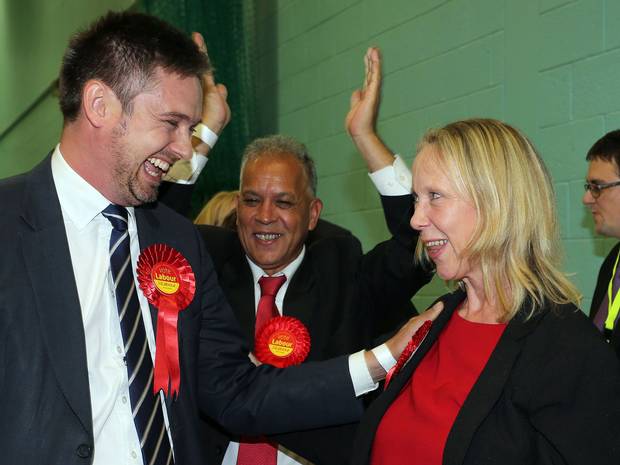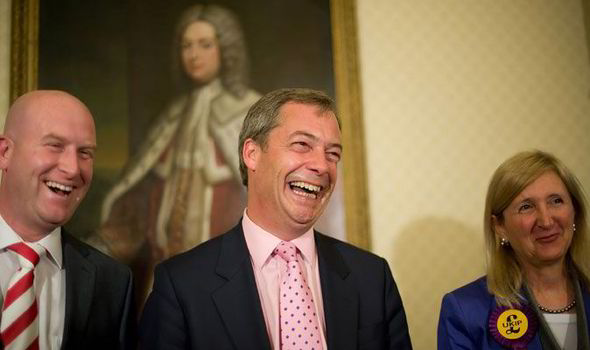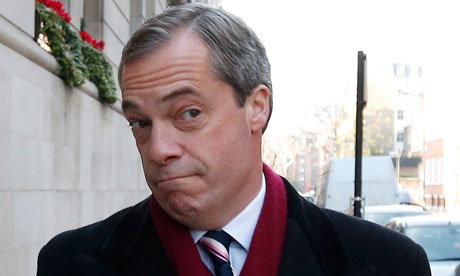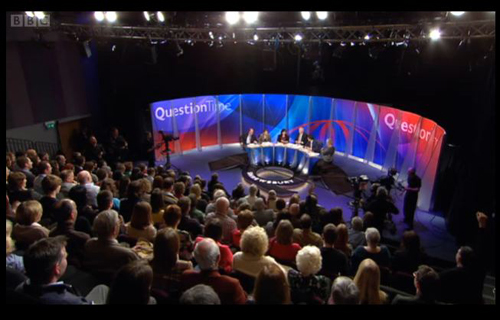Home » United Kingdom Independence Party
Liz McInnes won. Live with it.
The “thrill of the chase” is the layman’s version of a body of marketing research looking at why humans expend a lot of energy in pursuing a goal which they find rewarding, and yet effortful.
Apart from THE major policy, of pulling up the drawbridge on the torrent of immigration we’re apparently experiencing on an industrial scale, many members of the general public are at a loss to identify a single meaningful policy of UKIP. This is particularly the case in UKIP’s submissions on NHS policy, where scattered offerings do not form a coherent picture.
If anything the policy mutterings of UKIP, which do not in any form constitute a policy, go along the lines of a fundamentally corporatist flavour, ‘making the NHS more efficient’ and ‘laying off the excessive staff’, rather than valuing the workforce, for example many nurses who’ve not benefited from a pay rise for many years.
But it could be that the sheer enjoyment of seeking pleasure ultimately from UKIP matters more than what they wish to do on the NHS.
The ‘scattergun’ nature of UKIP decision-making is of course hugely fraudulent. At one moment, UKIP can offer motherhood and apple pie, such as insisting on an exclusion from TTIP, the hated transatlantic trade agreement. It can then do a volte face at any moment, in the hope that potential voters will have selected in their minds the policies most attractive to them even if they subsequently become redacted. UKIP, also, despite wishing to present a united front, can present polar opposite views to voters who have previously voted Labour like Gillian Duffy from those presented to normally Conservative voters in the South West or East of England.
UKIP is an embarrassment politically. All the criticisms have been well rehearsed elsewhere. The criticisms against Liz McInnes, who has spent the last thirty years working in the NHS, have been utter desperation. The BBC, whose credibility is as embarrassing (and some might say offensive) as a Jeremy Clarkson numberplate in Argentina, would much rather focus on how pathetic UKIP insisted on a recount, rather than mentioning what McInnes might offer her constituents in terms of her wealth of experience on valuing staff in the NHS.
But here’s some sanity from James O’Brien.
In a sense we get the media we pay for, but I for one do not wish to pay an enhanced contribution to listen to the bigoted ranting of BBC domestic news commentators as a form of indirect taxation. The output of the Corporation in domestic news has been for some time worse than pathetic.
It has been worse than getting blood out of a stone in trying to get the BBC to cover the diabolical NHS reorganisation which has so far cost a huge amount of waste in terms of redundancy payments and legal fees for competition experts. Labour has next to no hope in getting a fair crack of the whip when it comes to their flagship policy of combining health and care, which many specialists now feel is long overdue in England. There has to be some semblance of fairness in the BBC’s coverage, such that, for example, it can be difficult to incumbents to increase their majority (a meme rapidly disseminated by the CCHQ ably assisting the BBC). Also, the swing away from the current Coalition in the Heywood & Middleton seat was actually more than thirty percent. Labour’s share of the vote did go up in Heywood and Middleton.
The majority for Liz McInnes might constitute a fewer number of people, but overall votes have been declining. The Conservatives which lost both the seats know their leader David Cameron is a dead duck. I do not particularly like Ed Miliband’s leadership style, but I am truly sickened with the way that the Coalition has incessantly lied about how the deficit was caused unilaterally by Gordon Brown. This sheath of lies has given credence to the shambolic lie of economic credibility by the Conservatives – despite a level of debt which is now exploding out of all control.
In a ‘first past the post’ system, Liz McInnes won. Live with it.
For many, the chase of UKIP will be sufficient escapism, until the moment such voters enter a hospital to be treated by an Asian nurse on the minimum wage who will show the patient excellent professionalism anyway. It is impossible to tell the outcome of the general election of 2015, but it might be worth all the political parties not publishing manifestos but statements of their unnegotiable areas.
If it turns out UKIP does not want to negotiate on its flat-tax for the NHS from UKIP manifestos popping through the letterbox, at a time when NHS funding is a national cause for concern, then we know we do not have to buy any extra toilet paper.
On ‘the thrill of the chase':
Labroo A.A. & Nielsen J.H. (2010). Half the thrill is in the chase: Twisted inferences from embodied cognitions and brand evaluation. Journal of Consumer Research. 37(1), 143-158.
You wouldn’t get a plumber to mend your fuse box. so why would you let Farage near the NHS?
I saw up close and personal how some people vote in elections. My mum asked me to work out how to package her postal vote using the declaration, ‘envelope A’ and ‘envelope B’. Whilst I did not actually see how she did the vote itself, I did ask my mum how come she did the vote in seconds.
“It’s what I always vote.”
I can well believe that. She attends, like many, the NHS – in her cataracts. She will have a procedure done on the NHS, and yet I know she has very little in how the NHS works.
She has only ever attended our local A&E in London with me very infrequently. We had to queue for hours, but we put this down to being infrequent attenders, ‘being unlucky’, ‘to be expected’ etc.
I bet you if that if you were to ask my mum about section 75, or clause 119. If you asked her about Jos and the other Lewisham campaigners, she would immediately start smiling though.
That nice man, Nigel, is possibly a man you might like to have a drink with, particularly if you liked drinking. I definitely do not wish to imply he’s a problem drinker, despite wishing to be down the pub during the day.
But in much the same way you wouldn’t like a plumber to mend your fuse box, the chances are you wouldn’t like UKIP to run the NHS.
You might be tempted ‘to give them a go’, particularly if you feel the elections do not matter.
But the factors stopping you voting from UKIP require you partly to have decided that they would be incompetent at running the NHS.
It is incredibly difficult to work out what the official UKIP policy on the NHS. It appears that they’re in favour of the usual corporate memes of ‘private sector efficiency’ – for all we can tell they would have been in favour of section 75.
They appear to be in favour of free trade, but not necessarily as a member of the European Union. I have never heard them voice an opinion on the EU-US free trade treaty investor protection mechanisms. This may or may not change the landscape of how multinational corporates can take over running of bits of the NHS, and get away with it.
Nigel Farage simply fell apart in his interview with Andrew Neil, but I don’t suspect many people in the general public watched it carefully. I know my mum for example couldn’t care less that his tax policies, i.e. how you pay for the NHS, are simply incoherent.
So I don’t particularly need to make a rational argument that Nigel Farage and UKIP running the NHS would be like getting the presenters of BBC News to do complicated brain surgery.
They might win a sizeable proportion of the vote, but, when it comes to the general election, their offerings on health, education, world affairs, benefits, home affairs, and foreign policy will mean they will never be asked to form a government.
They keep Question Time and Any Questions amused, as well as other current affairs programmes, and I dare say they’ll do sufficiently well in the European Elections to ensure they continue being invited to perform their hopeless skit.
But it would take an earthquake of some sort for my mum to wish to vote for them. That’s why I don’t think they’ll make it.
If the NHS is a sacred cow, it is possibly about to sacrificed at the altar of a UKIP-Tory coalition.
In between elections, some of the electorate leave it up to Polly Toynbee to construct a forensic dissection of the section 75 Regulations on competition and choice in the NHS, or park a discussion of inequality at the foot of a major tome on the subject by Thomas Piketty.
The Guardian readers of North London therefore pride themselves on their immaculate understanding of their world. They occupy the tents of St. Paul’s Cathedral, or protest about tax on Oxford Street.
Who’d then have thunk of a novel way of influencing democracy through the good old-fashioned ballot box?
It sometimes seems that every cappuccino sipping intelligentsia fluent in every investor protection clause of TTIP can lay the blame of every evil at Andy Burnham’s door, without offering anything constructive to help Labour run the National Health Service from May 8th 2015.
If there’s a protest vote to be had, it should go to the nice anti-establishment man who went to a minor public school.
You can’t simply get enough of him on Question Time, LBC, or the Andrew Marr Show.
Just a pity you have absolutely no idea what UKIP stands for, in terms of the National Health Service.
The arithmetic might easily work out that UKIP come first with the Conservatives third, with the Labour Party coming second. Then it won’t matter that Andy Burnham MP has just returned from Strasbourg to try to negotiate some exclusions for us for the EU-US trade treaty.
It won’t even matter that Jeremy Hunt MP has failed to bring the long-awaited reform of clinicians, at Draft Bill Stage from the English Commission to combat scenarios such as Mid Staffs, before parliament.
Can it really be that the NHS is a spectator sport for the general public, where anyone who talks about the NHS is some crackpot, fringe ‘special interest’ group?
Isabel Hardman writing in the Spectator on 20 September 2013:
“Paul Nuttall MEP is about as different a Ukipper as you can get from Nigel Farage. He’s a bald Liverpuddlian, for starters. This means he can appeal to a different section of the electorate, and one that as Fraser said earlier, Farage needs to attract. He told the conference that Labour voters are ‘easy pickings’, adding:
‘It’s clear now ladies and gentlemen that Ukip is now the official opposition to Labour in the North of England.’”
The usual defence for atypical UKIP opinions is that every party is choc-a-bloc with wackos and nuts, so any extreme, offensive opinions are to be tolerated – an argument used at full throttle from Nigel Farage, UKIP leader, this morning on “The Andrew Marr Show”.
But clearly Nuttall believes in what he is saying. Besides, Paul Nuttall is the UKIP MEP for North West England, UKIP Deputy Leader.
Paul Nuttall MEP indeed talks about the NHS, or rather the privatisation of it, with great fondness:
“I would like to congratulate the coalition government for bringing a whiff of privatisation into the beleaguered National Health Service. The fact that successive governments have undertaken what they call ‘substantial’ changes to the NHS should tell us all we need to know: there is something fundamentally wrong with how we treat the ill in our country.”
“Beleaguered” in what sense? Possibly he means the NHS is at ‘death’s door’ having had its reputation totally destroyed by the UK media.
Or maybe he means that spending for the NHS actually fell in real terms last year, as has been pointed out in a letter to Jeremy Hunt by Andrew Dilnot CBE much to the disgust of the current Government.
“The NHS is the second biggest employer in the world, beaten only by Walmart, but as with all state monopolies, it is costly, inefficient and stuffed with bureaucrats. In New Labour’s NHS, for every nurse there is a manager and vital workers, such as midwives, are falling in numbers.”
Except the NHS, prior to privatisation, has been considered to be one of the most efficient healthcare systems in the world.
“The problem, however, goes far deeper. I would argue that the very existence of the NHS stifles competition, and as competition drives quality and choice, innovation and improvements are restricted.”
Ah – that wonderful policy plank called ‘competition’, the poster boy of neoliberalism, which has been one of the biggest disasters in English health policy ever, and which has even been called “killing the NHS“.
This is no time for hyperbole, of course.
“Therefore, I believe, as long as the NHS is the ‘sacred cow’ of British politics, the longer the British people will suffer with a second rate health service.”
If the NHS is a sacred cow, it is possibly about to sacrificed at the altar of a UKIP-Tory coalition.
What have UKIP got to say on the NHS?
Hugh Muir may have just done an extensive synthesis of the faults of UKIP, but their party is still expected to do very well in the forthcoming European elections.
On the UKIP issues website, it is declared that:
“The NHS and state education strain under a population increase of 4 million since 2001.”
Clearly free movement of persons/workers is going to be a major issue for UKIP in discussing the NHS, but it would be sheer folly to ignore the large numbers of workers from ethnic minorities groups which work day-in and day-out for the NHS.
That sentence on NHS and state education is the only formal mention of the NHS on the “Issues” page.
However three other things are mooted.
“Open GP surgeries in the evening, for full-time workers, where there is demand.” This is of course a perfectly sensible policy if resources allow.
“Locally-elected County Health Boards to inspect hospitals – to avoid another Stafford Hospital crisis.”
This of course could be seen as dogwhistle politics too.
Despite Jeremy Hunt’s regular mentions of Mid Staffs, the current Government has failed to introduce before parliament a draft Bill on the regulation of health professionals, proposed by the English Law Commission – and time is running out.
And in the voluminous Health and Social Care Act (2012), there is no clause on patient safety – apart from the one abolishing the National Patient Safety Agency.
The discussion around patient safety essentially revolves around budgeting and safe staffing, not local health boards. Section 44 of the Mental Capacity Act 2005, legislating on wilful effect, did exist at the time of many of the possible offences at Mid Staffs.
“Make welfare a safety net for the needy, not a bed for the lazy. Benefits only available to those who have lived here for over 5 years.”
This runs the risk of ‘dog whistle politics’, as nobody reasonable would dare to call the whole community of disabled citizens ‘lazy’.
However, a useful account of UKIP’s main policies on health are provided by Keith Rowe here.
But there are still glaring gaps – such as what is UKIP’s view on the current expenditure in the private finance initiative? It appears that UKIP has waged war of sorts on multinational corporates. Cynics might say this has been a means to capture the Labour vote. Others say that this is not a general war on finance, particularly given Farage’s stockbroker background.
Many people intending to vote UKIP are not intending to vote UKIP in the general election. But the question is why are they voting for UKIP at all?
It could be that they have been whipped up into a media hysteria, which issues such as the NHS simply can’t generate.
But this explanation is quite unlikely – given, for example, the intensity of discussion around the NHS when Question Time visited Lewisham.
And, frustratingly for supporters of the NHS, UKIP do not spend much time discussing the quite damaging effects the investor protection clauses of the EU-US free trade treaty might have.
This has been left to other parties, including Labour, the Green Party, and the National Health Action Party, to discuss.
I sincerely hope this blogpost has not been too friendly – as Patrick O’Flynn, Communications for UKIP, has said in the past: “With enemies like you, who needs friends?”
Will the war over NHS privatisation be won on the social media or on Question Time?
In his lecture for the LSE recently called “These European Elections Matter”, Nigel Farage explained how the 1999 European Elections had been a ‘gamechanger’. This election had apparently returned three MEPs, and Farage explained that this result had only been achieved through the method of proportional representation. Farage concluded that, despite no MPs, this had meant UKIP was suddenly being involved in contemporary political debates on the BBC such as “Question Time” or “Any Questions”.
The situation how the UK entered Europe is almost a counterpoint to the situation why people want the NHS to leave behind market dynamics. The United Kingdom referendum of 1975 was a post-legislative referendum held on 5 June 1975 in the United Kingdom to gauge support for the country’s continued membership of the European Economic Community (EEC), often known as the Common Market at the time, which it had entered in 1973 under the Conservative government of Edward Heath. Labour’s manifesto for the October 1974 general election promised that the people would decide “through the ballot box” whether to remain in the EEC. The electorate expressed significant support for EEC membership, with 67% in favour on a 65% turnout. This was the first referendum that was held throughout the entire United Kingdom.
There has never been as such a referendum on whether the market should be forced to leave the NHS, but many feel that this is an equally totemic issue. It’s quite possible that the 2015 general election on May 7th, will have a low turnout generally if all the main political parties fail to capture the imagination of the general public. Using a market entry analogy, the question is how UKIP and NHAP enter the market of politics. It’s possible that UKIP could manage to come top in the European elections, though this is yet to be seen. UKIP are not opposed to UK in some sort of market with Europe, whilst wishing to not be embroiled in ‘spending £7 million a day for something undemocratic and unaccountable from Brussels’. Likewise, NHAP (National Health Action Party) is also concerned about the lack of democracy and accountability which appears to have become a pervasive theme in English NHS policy, and wish the NHS not to be fettered by the markets (for example European competition law). UKIP appear virtually weekly on Question Time, so the question is in part how can health issues compete for air time? Labour could even benefit from their greater presence in explaining their health policy, which is supposedly to escape the free market and TTIP. And NHAP could hold Labour to account on this issue, and other significant issues such as NHS reconfigurations and PFI. Conversely, UKIP is all for free trade.
Dr Lucy Reynolds soldiers on. As an academic in the highly prestigious London School of Hygiene and Tropical Medicine, Reynolds has developed an understanding of health policy which is unrivalled by many. Lucy has been quite successful in getting her well informed views across in the social media.
Dr Lucy Reynolds doesn’t have the luxury of Question Time.
Nigel Farage’s main complaint about Question Time is one of hostility to his party’s stance:
“I am one of the few people who can’t really complain about the editorial policy of Question Time having been on it 26 times since I was first elected in 1999. In terms of the coverage it gives Ukip I have found it fair and in the past few years the programme has even started accepting Ukip panellists other than me! But there have been a couple of programmes in which my colleagues and I have faced a hostile audience which in no way represents how Ukip is normally received or which are representative of the opinion polls. I am not pointing the finger of blame at the QT team but the question I want to ask is whether the Question Time audiences being exploited by the hard left?”
Even when Question Time was recently hosted at Lewisham, the number of questions on the NHS was kept to a bare minimum. This has been a general trend with this flagship TV programme, although the producers consistently cite that they can only air debates on questions proposed by audience members. However, occasionally dissent does ‘break though’ unpredictably. There have been over 86,000 ‘hits’ for a lady in the audience in Lewisham QT here
If it feels as if Nigel Farage is rarely off Question Time, that’s because he isn’t. Farage appeared more times on the programme than any other politician in the last four years. Top performers on #BBCQT include Nigel Farage, Vince Cable, Ken Clarke, Caroline Flint, Peter Hain, Caroline Lucas, Theresa May, and Shirley Williams. The arguments for Farage appealing to producers are that he is charismatic, inspires debate and helps them to fufil their requirement to give representation to smaller parties. But surely the same can be said for some experts in health policy?
Dr Louise Irvine (@drmarielouise), a GP in New Cross, south east London, and chair of the ‘Save Lewisham A&E’ campaign, has recently announced she will be standing for the National Health Action Party in the European Parliament elections on the 22 May 2014. Dr Irvine has said the NHS was under threat from an impending EU-US trade deal and the Government’s policies of ‘top down reorganisation, cuts and privatisation’.
She said: ‘I want to use this election to raise awareness of the imminent danger posed to the NHS by the EU/US trade agreement which will allow American companies to carve up the NHS and make the privatisation process irreversible.
‘I also want to alert the public to the gravity of the threat to the NHS from this Government with its programme of cuts, hospital closures and privatisation and to send a powerful message to politicians in Westminster and Brussels that people will not stand by and let their NHS be destroyed.
‘If elected, I will strive to ensure that EU regulations don’t adversely affect the NHS and are always in the best interests of the health of British people. The health of the nation spans all areas of policy from the environment to the economy.’
Dr Irvine is not only the “new kid on the block”. Rufus Hound is planning to run for the European Parliament to campaign against the privatisation of the NHS, saying he wants to preserve “one of the single greatest achievements of any civilisation”. In an impassioned blog post, he accused the Conservatives of wanting to sell off the health service to party donors – claiming that the Health Secretary, Jeremy Hunt, was “killing the NHS so that his owners can bleed you dry”.
The NHA was set up by Dr Richard Taylor, a former independent MP, to campaign against the Government’s Health and Social Care Act, introduced under the previous health secretary, Andrew Lansley. The party plans to field 50 candidates in the 2015 general election. Dr Clive Peedell (@cpeedell) has also been talking to the social media to get the NHAP’s message across’ he is one of the co-leaders.
The Max Keiser/Clive Peedell interview is here.
To give them credit, Dr Marie Louise Irvine and Rufus Hound offer us a chance to discuss the NHS, in the same way Nigel Farage and, say, Patrick O’Flynn (@oflynnexpress) offer us a chance to discuss our membership of Europe. The criticism is that they represent single issues and do not have a coherent corpus of policies across the full range of policy areas, and indeed have no realistic chance of forming a government. But paradoxically they both do offer a chance for domestic policy to operate in such a way Portcullis House doesn’t become another neoliberal outpost of the Federal United States of Europe. In the NHS’ case, socialism might only survive if it is not engulfed with yet more Atlantic Bridge-type stuff next parliament. But UKIP would not probably stop that. Who knows if Labour would be able to either in reality.






